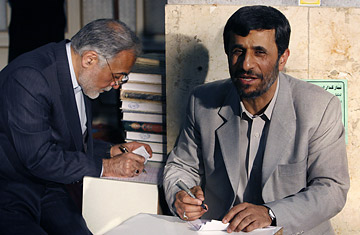
Iranian President Mahmoud Ahmadinejad, right, fills in his ballot for the parliamentary elections in Tehran, March 14, 2008.
Conservatives loyal to President Mahmoud Ahmadinejad have emerged as the big winners in an Iranian parliamentary election whose large turnout surprised politicians across the spectrum. The conservative victory is not based simply on the fact that its candidates prevailed, but also on securing a 60% turnout in elections from which all the most prominent reformist candidates were disqualified from running.
The size of the turnout, rather than the identity of the victors, was the focus of much of the official media in the days after the election. And, of course, the turnout was helped by the reformists remaining in the race, hoping to win a strong minority bloc, despite disqualifications by the unelected Guardian Council reducing their numbers to 130 candidates. While they have gained about 40 seats in the provinces, they have so far failed to secure a single seat in the capital. By the time the Tehran votes were counted Monday noon local time, 16 out of 30 seats had gone to candidates of the pro-Ahmadinejad United Principalists' Coalition, with the remainder to be contested in a run-off later in April or May. Theoretically, reformists still could take the remaining seats.
"It's not only the results that are shocking, but also the way they have been announced," said Jalal Khoshchehreh, an editor at the center-reformist newspaper Kargozaran, echoing the sentiment not only among reformists, but also among conservatives in the Wide Coalition of Principalists, who are critical of Ahmadinejad's policies. Both protested the announcement by Interior Minister Mostafa Pour-Mohammadi — before the counting was even complete — that the United Principalists had won 71% of the seats. "The Interior Minister who is supposed to be a neutral body clearly crossed a red line," wrote one reformist commentator.
In a clear indication of the split among conservatives, the Wide Coalition of Fundamentalists, close to the more moderate conservative figures such as former nuclear negotiator Ali Larijani and current Tehran mayor Mohammad-Baqer Qalibaf, wrote a formal letter of complaint to the Guardian Council accusing pro-Ahmadinejad conservatives of irregular activities at some polling stations.
But the upshot of the election appears to have been a reaffirmation of the status quo."The election results are nothing but a continuation of the conditions that had been created, including the disqualifications. We knew even before the elections were held that about 60% of the seats would go to the conservatives," commented Mohammad Atrianfar, an advisor to technocratic forces around the likes of former President Akbar Rafsanjani. "But the situation speaks for itself," he added, pointing to the fact that the Tehran candidate with the highest votes, current Majles Speaker Gholam-Ali Haddad-Adel, still received a million votes less than the leading reformist candidate in the movement's electoral heyday.
The conservatives' may not have the same level of mass support as the reformists once did, but they are better organized. Many voters arrived at ballot boxes (erroneously) convinced that the only list backed by the Supreme Leader, Ayatollah Ali Khamenei, was that of the pro-Ahmadinejad UPC. They had been told that in their mosques, or through text messages sent to their mobile phones, or through neighborhood word-of-mouth. At the Lorzadeh Mosque in southern Tehran where President Ahmadinejad cast his ballot, Golbarg Tavakoli, an old lady who could barely walk had come, she said, "to support the UPC and pay tribute to Imam Khomeini through voting — it is because of him that we are no longer servants of the West," she added.
Reformist voters were more resigned. At the Hosseiniye Ershad Mosque in North Tehran, Aliyeh Mostofovi, 50, said she had come to vote although she thought the results wouldn't be to her liking. "Western countries always say we're forced to vote. I've come to show that we vote because we want to," she said.
Atefeh Shams, 26, said her husband had admonished her that if she voted she was a traitor to herself and her people. But she added, "My friend finally convinced me that it was important that we make a decision, even if it's between bad and worse." Her friend Samira Parto, 27, chimed in, "It's our poor lives that are at stake here, not the lives of those people outside Iran who encourage us not to vote. We don't want internal war, we don't want an invasion, we don't want a revolution. We just want to make sure we don't lose the 'Republic' aspect of the Islamic Republic — and that we vote enough reformists in the parliament to prepare the grounds for next year's presidential elections."
Despite the result, some analysts saw the election as an exercise in getting reformist and moderate voters interested in elections again, to prepare the ground for a challenge to Ahmadinejad in next year's presidential race. Khoshchehreh even sees what he calls an "unwritten, tactical coalition of moderate conservatives and reformists" gradually fortifying into a "real, strategic coalition." These two groups are closer to each other than either is to Ahmadinejad's camp in terms of their pragmatic outlook on foreign policy and the economy. With about a third of the new parliament consisting of reformist and independent candidates, Atrianfar says there is a good chance that this bloc could attract critical members among conservatives, especially if Ahmadinejad continues with his inflationary economic and confrontational foreign policies. That would increase the chances of a "critical coalition" among reformists and conservatives to pave the way for a pragmatic political force.
